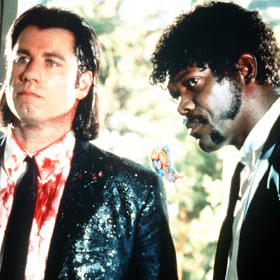

A landmark event in the emergence of pop culture as art and a high watermark for independent cinema as a commercial vehicle, Quentin Tarantino's polished, small-time crime saga strode up to the door of mainstream respectability – first knocked upon by Steven Soderbergh's 1989 curiosity Sex Lies and Videotape – and kicked it off it's hinges, heralding the arrival of a brave new world where style was the new substance. A carefully crafted series of pilferings and homages lifted from decades of cinema absorbed like osmosis by it's author in a run-down video store in LA, Pulp fiction was penned by Tarantino during his European press tour promoting Resevoir Dogs. It's perhaps unsurprising then that the majority of the picture takes place in a context free vacum characterized by nameless bars, random diners and unremarkable motel rooms, populated by thinly sketched-hyper stylized caricatures, whose stories are picked-up, put down, peered in on, and then, for the most part ostensibly dismissed as a punchline ("Zed's dead, baby. Zed's dead").
Both the characters in question, and their respective dilemmas – a mob boss looking to retrieve some merchandise, a chancing boxer refusing to take a dive, a weary hitman's epiphany – are the worst kind of cliched, hokey, airport departure lounge drivel, and Tarantino knows it, hence his opening the film with the dictionary definition of the word 'pulp.' Weened as he was on a steady diet of Italian Westerns and Japanese samurai pictures, Tarantino understands that the presentation is everything, and he took these vacant, done to death set-ups, coated them in jet-black humor, and lit the whole thing up like the Las Vegas Strip on the fourth of July. Looking back it's hard to believe he managed to wring so much that seems fresh and vibrant out of vignettes so oddly archtypal. Equally hard to fathom is how a film that's not actually, really about very much of anything can run for more than two and a half hours without a single dull moment.
None of the characters here are particularly bright, or particularly good at what they do. Marcelus Wallace is such a badass mob boss he gets raped by Hillbillies in the middle of downtown Los Angeles. His Mrs. is such a streetwise moll she snorts a bag full of scag thinking it's coke. Vincnet Vega's hitman is so incompetent he accidentally blows a guys head off one minute, then leaves his gun on the counter for his intended target to find the next. Harvey Keitel's Winston Wolf arrives on the scene of a rather inconvenient, accidental homicide inside of a car with the vaguely implied reputation of a legendary 'fixer'. What does he actually do? Tells Jules and Vincent to clean the windows and throws a blanket over the bloody seat. Absolutely ridiculous. Everything from his straight backed pomposity to his bow-tie and dimestore shades, invite you to laugh at him – and the rest of them for that matter – and yet in Tarantino's hands they each exude a quiet air of monolithic cool, wearing it like a suit of armor.
Part of its genius lies in the endlessly quotable, rat-a-tat nature of the rapid fire dialogue ("Does he look like a bitch!?"), but so much more is about the precise casting and marrying of actor to part. How they chortled when Tarantino first suggested John Travolta – whose biggest hit in more than a decade was Look Who's Talking. In retrospect it's hard to imagine the part played by anyone else. Samuel L. Jackson built his entire career off of that once scene in Brett's apartment, and to this day still trades most often on projecting that aura of dangerous volatility. In the decade and a half subsequent Pulp Fiction would give birth to a thousand shameless imitators as well as one or two legitimate successors (most notably, Danny Boyle), while it's creator would either sytematically redefine the face of genre cinema, or disappear up his own ass, depending on who you ask. But his legacy endures. As divisive today as he is beloved, his output remains boldly imaginative, shamelessly self-indulgent, and never, ever boring.
Last week, Harry Potter author J.K. Rowling showed her support for the anti-trans ruling by…
https://www.youtube.com/shorts/rxKoxlF0CQM Rugby supporters were left stunned at Toulouse stadium in southwest France when a parachutist…
Former Tonight Show host Jay Leno has shared a rare insight into the daily activities…
Virginia Giuffre, a survivor of Jeffrey Epstein's sexual abuse and one of the earliest and…
President Donald Trump is once again under fire, this time for his "disrespectful behavior" at…
Former First Lady Michelle Obama recently opened up in an episode her podcast, IMO, to…